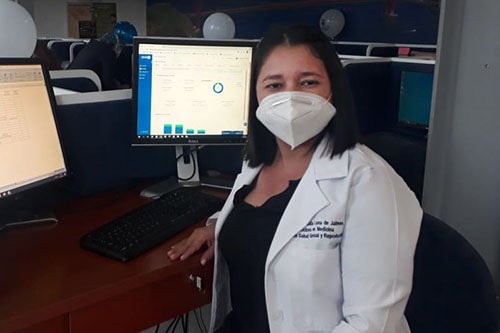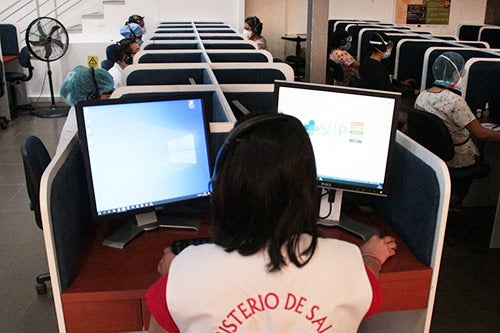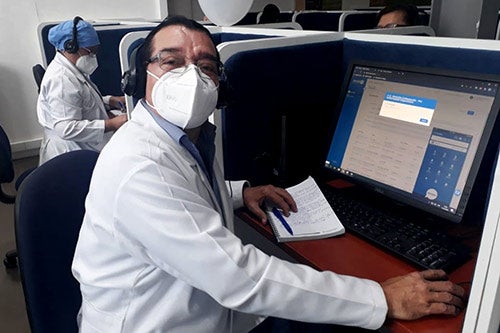News
El Salvador begins telemedicine for pregnant women, new mothers and other priority groups
- 23 September 2020
News
SAN SALVADOR, El Salvador – In a bid to control the COVID-19 pandemic, El Salvador has enacted strict lockdown measures. Still, the pandemic is taking a serious toll, with more than 27,000 cases of the disease confirmed by mid-September. Related economic impacts have left more than 162,000 households facing severe food insecurity.
Movement restrictions, fear of contracting the virus and economic stresses have made accessing critical health services more difficult for pregnant women, new mothers and young children. Need for mental health services has also increased.

In response, the Government of El Salvador launched a medical telecare service in August. In its first phase, it is serving three priority groups: pregnant and post-partum women, children under the age of five, and people requiring mental health care.
Through the telephone number 131, callers can reach health personnel including gynaecologists, paediatricians, general practitioners, family doctors and others.
“Dialing 131 will provide support for issues related to your pregnancy, your baby or your young children, and thus will improve the health of your family from home,” said Gabriela de Bukele, the country’s First Lady, who has been working to promote the programme.
The initiative is being run by the Ministry of Health with technical and financial support from UNFPA and the Embassy of Canada. “As a mother, I have reflected on how difficult it must be to be pregnant at this time, due to the doubts women must have and their fear of getting infected,” said Karolina Guay, Canada’s ambassador to El Salvador.

Doctors participating in the initiative say it has been a new way of working.
“As health professionals, they teach us that the idea is to see the patient face-to-face, to be able to listen to them and examine them. That was a challenge at the beginning,” explained Dr. Ana Julia Luna de Jaimes, supervisor of the medical telecare system.
But the change has been worth it, she says. Now, she and her colleagues are able to provide care in ways that minimize exposure to COVID-19 for both health staff and patients.
“Now I feel satisfied because I have developed new skills in technology and in care,” she said.
Dr. Herberth Roberto Vásquez, a gynaecologist and obstetrician working at the telecentre, says training has helped.
“I knew the basics of computing – very limited – but here we have had a learning process that has strengthened our knowledge. Now I feel stronger in managing a computer and health ministry programmes that are useful tools to better serve users.”

One of the added benefits of the initiative has been that doctors are now able to reach people who faced difficulty obtaining medical care even before the pandemic.
“With this care system we can help people, now not in our offices, but from different corners of the country, including places where many times there are no roads and the health unit is two or three hours away on foot," Dr. Vásquez noted.
Hugo González, UNFPA’s representative in El Salvador, added that telemedicine offers many potential advantages: “Costs could be reduced to the population and institutions, and foster equity as all people will have equal access to equal need regardless of their socioeconomic variances… Waiting times are reduced. It can potentially help to prevent more severe complications, and it will protect women and children from exposure to COVID-19.”
The service operates from 7:30 am to 5:30 pm from Monday to Friday. The Ministry of Health expects to serve 750 people daily, reaching a projected 7,000 pregnant women, 6,000 young children and at least 1,200 patients in need of mental health care.